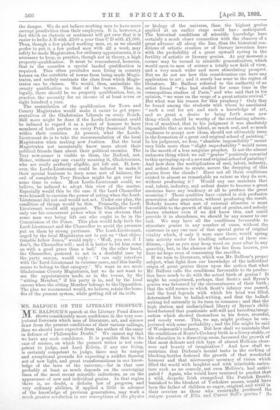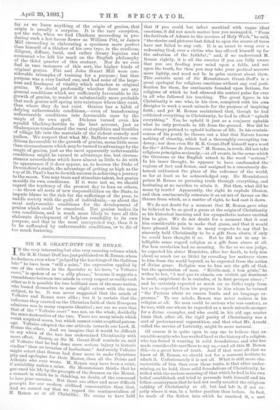MR. BALFOUR ON THE LITERARY PROSPECT.
MR. BALFOUR'S speech at the Literary Fund dinner shows considerably more confidence in the very con- jectural forecasts which men of literature, art, and science draw from the present conditions of their various callings, than we should have expected from the author of the essay in defence of " Philosophic Doubt." We cannot say that we have any such confidence. It is possible that in the case of science, on which the present writer is not com- petent to judge, and Lord Kelvin, if any one living, is certainly competent to judge, there may be unique and exceptional grounds for expecting a sudden flaming out of new light, and great transformations in our know- ledge of the laws of the universe,—for in that case probably at least as much depends on the converging lines of the most recent scientific inductions, as on the appearance of new and individual genius. In that region there is, no doubt, a definite law of progress, and very ordinary abilities, if applied a little in advance of the knowledge of previous generations, may work a much greater revolution in our conceptions of the physics or biology of the universe, than the highest genius applied at an earlier stage could hay) anticipated.
The historical conditions of scientific knowledge have certainly a much closer connection with the chances of a great advance all along the line, than the historical con- ditions of artistic creation or of literary invention have with the probability of a great upward spring in the fertility of artistic or literary genius. At any moment a corner may be turned in scientific generalisation, which would open to men of science a totally new field of view, and a very much wider and more stimulating prospect. But we do not see how this consideration can have any application to art ; and it surely has none to the region of literature. Mr. Balfour referred to the authority of an artist friend " who had studied for some time in the cosmopolitan studios of Paris," and who said that in his opinion, " we were on the verge of a great artistic revival." But what was his reason for this prophecy ? Only that he found among the students with whom he associated " such a zeal for art and such a knowledge of art, and so great a desire to bring forth some new thing which should be worthy of the everlasting admira- tion of mankind, that in his judgment it was absolutely impossible that so much talent, so much zeal, and so much readiness to accept new ideas, should not ultimately issue in the formation of a great and original school of painting." In his judgment, we fear, ' absolute impossibility" meant very little more than " slight improbability " would mean in the mouth of a less sanguine prophet. Is not the almost unknown thing which we call " genius " positively essential to this springing-up of a new and original school of painting? And how does the multiplication of zeal, talent, industry, and ardent desire to create, secure the dropping of this genius from the clouds ? Have not all these conditions existed to almost as remarkable an extent as they do now, without producing it ? Would any one maintain that zeal, talent, industry, and ardent desire to become a great musician have any tendency at all to produce the great musician ? These qualities have existed in rich profusion generation after generation, without producing the result. Nobody knows what sort of external stimulus is most favourable to the growth of this sort of genius, and nobody knows whether even if we did know this, and could provide it in abundance, we should be any nearer to our end. We may have all the conditions favourable to stimulate genius in any number of cases, without the existence in any one case of that special germ of original vitality which, if only it were once there, would spring into activity under the kindling influence of these con- ditions,—just as you may heap wood on your altar in any quantity, but, in the absence of the fire from heaven, you have no hope even of consuming the sacrifice. If we turn to literature, which was Mr. Balfour's proper subject, what light does our knowledge of the individual origin of great genius throw upon the notion that what Mr. Balfour calls the conditions favourable to its produc- tion have much to do with the actual birth of genius P It might be conjectured, perhaps, that Scott's and Byron's genius was favoured by the circumstances of their birth ; that the wild scenes in which Scott's infancy was passed, and the local legends with which his head was filled, determined him to ballad-writing, and that the ballad- writing led naturally in its turn to romance ; and that the high station and undisciplined liberty of Byron's child- hood fostered that passionate self-will and brooding imagi- nation which showed themselves in his fierce, scornful, and moody verse. This, we say, might perhaps be con- jectured with some probability ; and the like might be said of Wordsworth's infancy. But how shall we maintain that the conditions of Keats's Cockney birth in a livery-stable, or his education in a dissecting-room, favoured the growth of that most delicate and rich type of almost Hellenic clear- ness and beauty of imagination ? And how shall we maintain that Dickens's menial tasks in the corking of blacking-bottles fostered the growth of that wonderful humour and that microscopic accuracy of vision which filled the world with laughter and with inimitable carica- ture such as no comedy, not even MoliCre's, had antici- pated ? Again, who would have ventured to predict that a wild, despotic Irish evangelical like Patrick Bronto, banished to the bleakest of Yorkshire moors, would have been the father of children so eager, original, and vivid in their reveries as those who eventually produced the unique passion of guis and Currer Bell's genius P So far as we know anything of the origin of genius, that i origin is usually a surprise. It is the rare exception, not the rule, when we find Chatham succeeding in pro- ducing such a hot-house flower as William Pitt, or James Mill succeeding in elaborating a specimen more perfect than himself of a thinker of his own type, in the studious, diligent, diffuse, lucid, and rather dreary logician and economist who left his mark on the English philosophy of the third quarter of this century. Nor do we ever find in rare instances of this sort, the higher kinds of original genius. Pitt and John Stuart Mill were con- siderable triumphs of training for a purpose ; but tbat purpose was a very limited one, and had none of the large- ness and freshness of vitality which attaches to original genius. We doubt profoundly whether there are any general conditions which are sufficiently favourable to the growth of genius, to render it substantially more probable that such genius will spring into existence where they exist, than where they do not exist. Genius has a habit of defying unfavourable conditions,—even of transforming unfavourable conditions into favourable ones by the magic of its own spell. Dickens turned even his squalid blacking-bottles to the best account, just as Shakespeare transformed the rural stupidities and troubles of village life into the materials of the richest comedy and pathos. We suspect that what Mr. Balfour considers con- ditions favourable to the growth of genius, mean little more than circumstances which maybe turned to advantage by the magic of genius, just as the most apparently unfavourable conditions might be turned to advantage too, but circum- stances nevertheless which have almost as little to do with its appearance if it does appear, as, to borrow the Duke of Devonshire's simile, the advantage of getting as high as the top of St. Paul's has to do with success in achieving a journey to the moon. You may train and stimulate talent, but genius moulds its own conditions. If it were not so, we should regard the tendency of the present day to lean on others, —to throw all sorts of new responsibilities on the State, to impute blame to the rich for the sufferings of the poor, to saddle society with the guilt of individuals,—as about the most unfavourable conditions for the development of genius which could be conceived. But genius makes its own conditions, and is much more likely to turn all this elaborate development of helpless sensibility to its own purpose, and that in the most unexpected way, than it is to be suffocated by unfavourable conditions, or to die of too much fostering.



















































 Previous page
Previous page